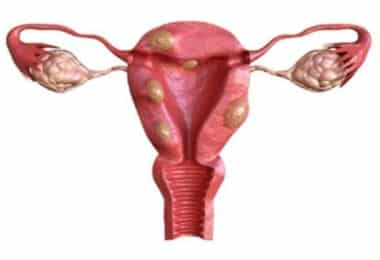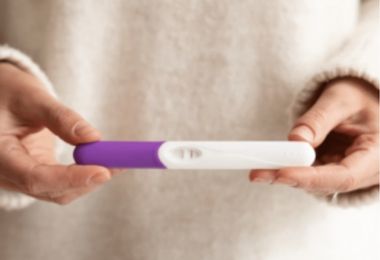
What Is Adenomyosis?
February 23, 2023
Symptoms and Causes of Infertility in Women
February 24, 2023
What Is Adenomyosis?
February 23, 2023
Symptoms and Causes of Infertility in Women
February 24, 2023
Ectopic Pregnancy Surgery
Ectopic pregnancy, known as ectopic pregnancy, is also called cornual and tubal pregnancy according to the location. Fertilization occurs when the woman's egg cells and the man's sperm cells combine. If the pregnancy has progressed in a healthy way, the fertilized egg passes through the fallopian tubes, reaches the uterus, and attaches to the uterine wall.
The place where the baby's development process is completed is the uterus. However, in some cases, the fertilized egg may attach to the tubes or the neck of the uterus before it reaches the uterus. This condition is called an ectopic pregnancy.

Image-1: Ectopic pregnancy.
If there is an ectopic pregnancy, the baby will not have the opportunity to develop in a healthy way. In fact, this situation causes factors that risk the patient's life. The egg, which clings to a point where it should not be attached and continues to grow, damages the patient's internal tissues and organs.
As a result of this situation, if the process progresses, the patient's opportunity to have a healthy pregnancy again disappears. In addition, life-threatening conditions such as internal bleeding may occur. For this reason, early diagnosis of ectopic pregnancy, ectopic pregnancy surgery process, and treatment after it is critical.
Ectopic Pregnancy Symptoms and Causes
There are many symptoms and causes that mean ectopic pregnancy. An ectopic pregnancy occurs because the egg attaches to the fallopian tubes.
Ectopic Pregnancy Symptoms
An ectopic pregnancy may show early pregnancy symptoms, which may be misleading for the expectant mother. Early pregnancy symptoms such as the absence of menstrual bleeding, vomiting, nausea, dizziness, breast swelling, tenderness, fatigue, and weakness are also seen in patients with ectopic pregnancy. In addition to these symptoms, symptoms such as vaginal bleeding, pelvic pain, difficulty in bowel movements and shoulder pain when there is bleeding in the tubes, severe pain in the abdomen when ruptured tubes, fainting, and dizziness are among the symptoms seen in patients with ectopic pregnancy.
Causes of Ectopic Pregnancy
In order to have a healthy birth, the formation process of pregnancy must be completed in a healthy nine months and the working principle of the body must be in balance. Pregnancy is a multi-layered process from the very beginning and goes through many stages.
In some patients, the normal pregnancy process cannot occur and a situation called ectopic pregnancy is encountered. This situation, which is extremely distressing and frustrating for the expectant mother, can endanger the life of the expectant mother if not diagnosed early. So, what causes an ectopic pregnancy?
The main reason for an ectopic pregnancy to occur is that the egg attaches to the fallopian tubes instead of the uterus. The egg has no chance to develop in this region. For this reason, a situation called ectopic pregnancy is encountered. Ectopic pregnancy is a condition that can be seen in every woman with an active sexual life.
Apart from the reasons arising from the definition of ectopic pregnancy, there are also factors that cause ectopic pregnancy. Other factors that cause ectopic pregnancy are that the pregnancy process occurs in people aged 35 and over, smoking and alcohol use, sexually transmitted diseases, infection in the patient's history, and damage to the tubes by this disease.
In addition to all these reasons, having had a pelvic inflammatory disease called PID, which refers to an infection of the ovaries and tubes before pregnancy, endometriosis, damage that may have been caused by surgical operations performed in the pelvic and abdominal regions, pregnancies caused by treatment, structural disorders in the reproductive organ, previously external factors. Having a pregnancy causes an ectopic pregnancy.
How Is Ectopic Pregnancy Diagnosed?
Early diagnosis of ectopic pregnancy is of great importance for the patient's recovery process. An ectopic pregnancy is understood by performing tests and tests. Ultrasound examination can be applied to understand whether the person who is diagnosed as pregnant in urine and blood tests has experienced an ectopic pregnancy.
During the ultrasound examination, it is aimed to detect a gestational sac in the uterus. For patients who do not have a gestational sac, ectopic pregnancy can be suspected. After the diagnosis, it is imperative that the appropriate and correct intervention is made quickly to the patient.
Ectopic Pregnancy Treatment
The treatment of ectopic pregnancy varies according to the period of the diagnosis. In patients with early diagnosis, if the patient's life is not in danger, drug treatment can be used. In the treatment of ectopic pregnancy with medication, a drug is injected into the patient that destroys the pregnancy tissue in the body. The ectopic pregnancy is terminated with the injection.
After the ectopic pregnancy is terminated, necessary controls are made and it is evaluated whether the ectopic pregnancy is terminated or not. In some patients, the injection may need to be repeated. If the patient has not had the chance to be diagnosed early, surgical treatment should be applied.
Closed Surgery with Laparoscopy
In cases of ectopic pregnancy that is not diagnosed early and causes very serious complaints, the patient should be operated on urgently. In particular, patients whose internal tissues and organs are damaged and who experience internal bleeding should be operated on immediately.
During the surgery, the damaged organs are tried to be repaired by performing surgical operations. First of all, it is aimed to end internal bleeding. But in some cases, the fallopian tubes are severely damaged and the tubes need to be surgically removed. Early diagnosis of an ectopic pregnancy is very important, as the removal of the tubes significantly reduces the possibility of getting pregnant in the future.
Considering the medical condition of the patient, ectopic pregnancy treatment is carried out in various ways. The closed surgery method is preferred in patients with mild clinical symptoms. In severe cases, treatment is carried out by open surgery. Therefore, the treatment plan varies from patient to patient.
Before Ectopic Pregnancy Surgery
Before the ectopic pregnancy surgery, the general condition of the patient is evaluated and a road map is drawn for the treatment. During the preparation for the operation, the patient is informed about the things to be done before the operation and the issues to be considered in the postoperative period.
The patient should stop eating and fluid intake for at least 6 hours before surgery. The drugs used by the patient should be reported to the doctor with the details of use. If used, blood thinners should be discontinued. In order to facilitate the operation process and make it more hygienic, it is necessary to clean the vaginal area of the person before the operation and come to the operation in a shaved manner.
After Ectopic Pregnancy Surgery
Ectopic pregnancy treatment is mostly performed by laparoscopic surgery method, preferring general anesthesia. The aesthetic results of the operation performed by making a small incision in the abdomen are better than the open surgery. The doctor gives special information to the patient about the conditions and side effects that may be experienced before and after the surgery. Side effects such as bleeding, infection, pain, and fatigue can be seen in every patient who has undergone ectopic pregnancy surgery. Regardless of the treatment method, it is normal to feel tired and sluggish for a few weeks during the healing process.
You may feel especially abdominal pain or discomfort after the surgery. If the pain does not decrease in line with the medications used, you should consult a gynecologist and obstetrician. While ectopic pregnancy treatment continues, the body's hCG level decreases over time. For this reason, the person may feel pregnant.
It may take several months for menstrual periods to return to their normal cycle. Once the person has had an ectopic pregnancy, other pregnancy processes may not progress well. Future pregnancy processes should be advanced under the guidance of an obstetrician and gynecologist. An ectopic pregnancy can be a traumatic situation for many people. After an ectopic pregnancy, even if the person does not plan to become pregnant, it is necessary to allocate time for the mood. It can be a good option to get psychological counseling when necessary.
You can find more information on this topic in our article "What is an Ectopic Pregnancy?"

